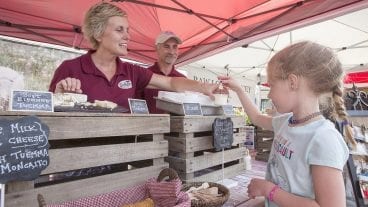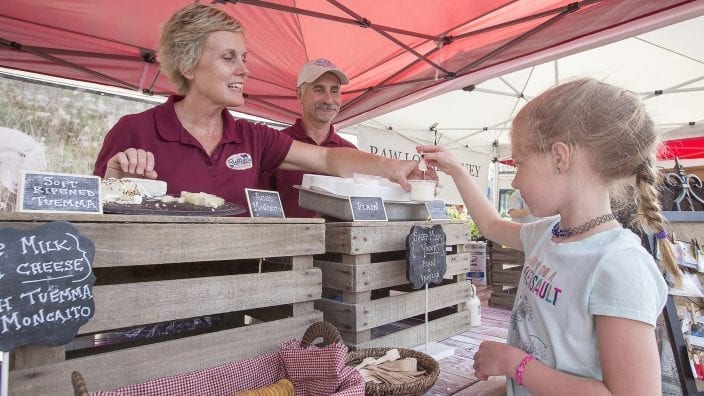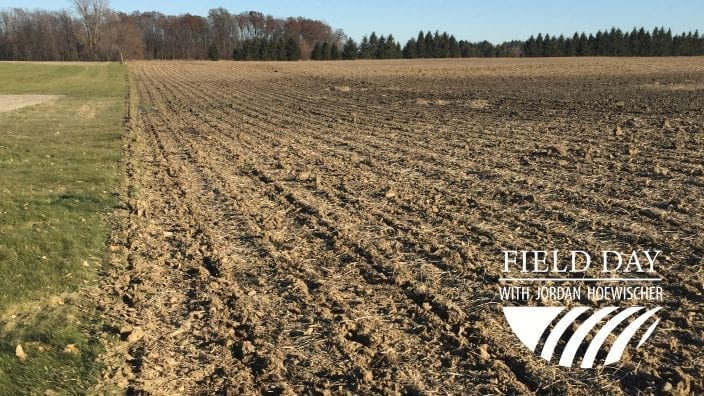Farmer’s Guide to Trucking Regulations available to Ohio Farm Bureau members
The guide includes a farm driver checklist, overview of state and federal regulations and exemptions, CDL qualifications and more.
Read More
Ohio Farm Bureau Director of Water Quality Research Jordan Hoewischer hosts Aaron Heilers for a discussion of the Blanchard River Demonstration Farms Network. Heilers is project manager for the network, which is a partnership between Farm Bureau and NRCS that showcases conservation practices and provides educational opportunities for the public, government officials and farmers to share what is being learned from the farms’ practices.
Field Day with Jordan Hoewischer is an ongoing series of conversations with experts and leaders who are helping to shape and secure the future of Ohio’s ag industry for generations to come.
Below are excerpts from the interview, and here is the transcript. Listen to the complete episode and past episodes via Soundcloud, or subscribe to the podcast on iTunes and Google Play.
Jordan: So what are the objectives of the project? I mean obviously, you know, …we’re demonstrating there’s certain things on a farm. So what’s the overall objective of the project?
Aaron: Yeah so we have three farms in the demonstration farm project but our overall purpose is, once we had those farms established, was to identify traditional and innovative conservation practices that exist out there and implement them on these particular operations and then showcase them and showcase their ability to reduce nutrients coming off the farm landscape. So we’re looking at testing basically conservation systems and controlling nonpoint source pollution. And you know as I go around the state and talk to folks, or people come into the demonstration farms to see what those farmers are doing. We’re basically trying to find practices in in three buckets. So farmers can implement practices in the field, they can do things at the edge of the field or they can do things in the stream. And so our goal is to have farmers from around the state be able to come here to these farms and pick and choose practices from each one of those buckets that fit their farming operation. You hear it all the time that not every farm is the same. Different weather, different soils, different management styles. And we want to make sure that we have options available that farmers can find that right practice for their farm and then have scientific data backing it up that it’s actually going to reduce nutrient loss from their landscape.
Jordan: What would be the limitations from you know what what are some of the messaging that we’re talking to people about using the successes and the limitations of subsurface placement at least with the way that Kellogg’s are doing.
Aaron: Cost. That’s the biggest thing and a lot of these practices come down to economics and that’s one of the main things that we like to talk about as people come through the farms is these practices may be really good at reducing nutrients. But can farmers afford to do them? Can they they manage the type of practice we’re asking them to do. And that’s the unique thing that we have with the Kelloggs and the Kurt farm and the size discrepancy there is can we make a practice like subsurface placement fit for both type of operations. So the way the Kelloggs do it with a 60 foot wide strip tillage toolbar costs the $180,000 dollars takes a heck of a big tractor to be able to pull it That’s not feasible for a 500 acre farm or somebody that’s smaller than that. So what tools are out there that can accomplish the same task. But can be more affordable for that smaller producer and that’s the that’s one of the things that we want to be able to flush out through this project.
Jordan: Is there anything that kind of pops out that that’s really resonating with people that come to the farm any like surprises or any anything that you think is kind of surprising that we’ve heard from from people coming out.
Aaron: We had a group out from Toledo a non-farm group that walked through one of the farm operations and we asked them that same question of you know what, what were they surprised to see that day and they their overall takeaway was that that they had no idea how sophisticated agriculture was. And I think that should make us all to kind of take a step back and realize that are we doing a good enough job of getting our message out to folks and having that conversation because you know what we did that day was show them how the farmer takes soil tests and gets those reports back and how they do yield mapping things that we probably take for granted that these folks had no idea that that most farmers are doing these types of things and yet these are folks that are out there in the community potentially saying things that are negative against agriculture. So I always keep that in the back of my mind when groups come in is that they most likely don’t know a lot of the things that we take for granted and that we have to kind of start at the base level and build them up from just a general knowledge standpoint and let them ask questions because you know as I said earlier, they are usually just generally curious about what today’s modern farmer is doing.


The guide includes a farm driver checklist, overview of state and federal regulations and exemptions, CDL qualifications and more.
Read More


The emergency fuel waiver to allow the sale of summer gasoline blends containing 15% ethanol will lengthen the period during which Americans can continue buying E15 from June 1 to Sept. 15.
Read More

The Small-Scale Food Business Guide covers federal and state regulations for selling food products such as raw meat, dairy, eggs, baked goods, cottage foods, fruits and vegetables, honey and more.
Read More

New resources and technology are broadening the different types of sales tools and strategies available to farmers.
Read More

ODA will enroll 500,000 acres into the program for a two-week sign-up period, beginning April 22, 2024, through May 6, 2024. Contact local SWCD offices to apply.
Read More

Katie Share of Columbus has been named ExploreAg and Youth Development Specialist for Ohio Farm Bureau.
Read More

Mary Klopfenstein of Delphos has been named Young Ag Professional and Ag Literacy Program Specialist for Ohio Farm Bureau.
Read More

The plan has been updated to give sole proprietors access to more rate stability and a smart solution that offers potential savings on health care.
Read More

The American Farm Bureau Federation, in partnership with Farm Credit, is seeking entrepreneurs to apply online by June 15 for the 2025 Farm Bureau Ag Innovation Challenge.
Read More

Adele Flynn of Wellington has been elected treasurer of the Ohio Farm Bureau Federation and now holds the third highest elected office in Ohio’s largest and most influential farm organization.
Read More